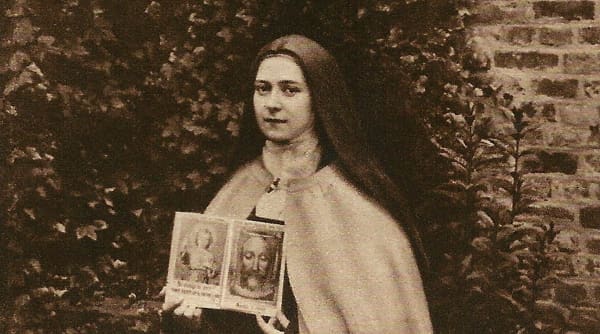Dear Father John, in St. Thérèse’s poem to Venerable Theophane Venard (stanza 6) she expresses her desire to save souls as a missionary . . .
 I love it, that unbelieving shore
I love it, that unbelieving shore
That was the object of your ardent love;
With happiness I would fly toward it,
If my Jesus were to require it one day…
But in His sight distances are wiped away;
It is but a single point, this entire vast universe!
My actions, my little sufferings
Are making God loved even across the seas.
I sense that this is evidence of her confidence and utter trust in God. I admit that it is a stretch for me to have this kind of conviction when my little sufferings come along. Can you shed light on the statement she makes about distances being wiped away in God’s sight and that our actions/sufferings can make God loved even across the seas?
We can only understand this through faith. Just as only through faith can we understand that Christ is truly present in the Eucharist. You may receive some insights into your question by reading our earlier post on “Offering It Up: Redemptive Suffering” Parts I and II. But I would like to offer a few other thoughts as well.
Making God Loved
The core of your question is found in your phrase “make God loved.” In a sense, building the Kingdom of Christ (as in, “Thy Kingdom come!”) consists in nothing more than increasing our love for God, and the love that others have for God. When we love God, we obey him and glorify him and delight in him – and that’s what Christ’s Kingdom is all about. So the true missionary spirit will always revolve around loving God more and more, and making him loved more and more.
But how does someone increase in their love for God? St. John explains that our love for God actually begins in God’s love for us. We experience God’s love for us, and our love for him is a response. “In this is love, not that we loved God, but that He loved us and sent His Son to be the propitiation for our sins” (1 John 4:10). This is how we are structured as human beings: our love flows from contact with things that are loveable. Our desire to be fully united with God (this is the essence of love) flows from our experience of God’s incomparable goodness, beauty, glory, magnificence, mercy – in short, from our experience of his love for us.
Blocks to God’s Love
Now, in this fallen world, burdened as we are with our fallen human nature, our experience of God’s love is inhibited. It is blocked by the lies of the devil, by our ignorance, pride, and sensuality, by the blind self-centeredness that constitutes the default setting of our fallen minds and hearts. What can penetrate those barriers? What can reach through them to give our starving souls an experience of God’s love that can jump-start our relationship with him and set us on the path out of darkness and into the light? God’s grace. He must reach into our darkness and touch us; he must call out to our minds and invite us; he must blow the trumpets of eternal love to topple the walls that cut our hearts off from communion with him: “You did not choose me but I chose you… No one can come to me unless the Father who sent me draws him” (John 15:16; John 6:44).
How is it, then, that we can help that process happen? How can we help pave the way for God’s grace to penetrate hearts that have not yet experienced God’s grace, or that are in need of a boost of grace?
Grace Invaders
God has chosen to make us partners in this work. Just as Jesus’ Father sent him into the world to give the world an experience of the Father’s love, so Jesus has sent us: “… as the Father has sent Me, I also send you… Go therefore and make disciples of all the nations” (John 20:21, Matthew 28:29). We are actually members of the mystical Body of Christ, and so our prayers, our obedience to God’s will, our loving acceptance of crosses – anything we do in union with Christ becomes a kind of extension of his incarnation into the world around us, an expansion of his redemptive self-offering into new nooks and crannies of human history and experience. Christ’s incarnation, life, death, and resurrection were an invasion of saving grace into the world; every Christian’s faithfulness to Christ is a continuation of that invasion.
And just as the different parts of a physical body are all connected (the tips of our toes are constantly being nourished by blood that flows out from the heart, and the vitamin D absorbed by the skin of our arms benefits the entire organism), so your prayers, sacrifices, and sufferings (united to Our Lord’s through your living in a state of grace and through your intentional offering of them to the Father in Christ) benefit the whole Mystical Body of Christ, wherever in the world the members of that Body may find themselves. This is why St. Paul is able to write: “Now I rejoice in my sufferings for your sake, and in my flesh I do my share on behalf of His body, which is the church, in filling up what is lacking in Christ’s afflictions” (Colossians 1:24).
St. Thérèse’s Experience of the Mystical Body of Christ
This was St. Thérèse’s experience, and the experience of so many other saints – canonized and not canonized – through the century. By following and imitating Christ, Christians become other Christs, and through them the transforming power of God’s grace that Christ unleashed in the world is spread to new hearts and minds. Thus, the Kingdom of Christ is built up and expanded by every Christian, no matter how small or insignificant or untalented they may appear.
I would like to finish this reflection by giving another quotation from St. Thérèse. In this passage from her autobiography, The Story of a Soul (quoted here) she expounds on the concept of the Mystical Body of Christ, which so effectively helps us understand our spiritual connectedness to the whole world:
Charity gave me the key to my vocation. I understood that if the Church has a body composed of different members, the noblest and most necessary of all the members would not be lacking to her. I understood that the Church has a heart, and that this heart burns with Love. I understood that Love alone makes its members act, that if this Love were to be extinguished, the Apostles would no longer preach the Gospel, the Martyrs would refuse to shed their blood… I understood that Love embraces all vocations, that Love is all things, that it embraces all times and all places… in a word, that it is eternal! Then in the excess of my delirious joy, I cried out: “O Jesus, my Love, at last I have found my vocation, my vocation is Love!… Yes, I have found my place in the Church, and it is you, O my God, who have given me this place… in the heart of the Church, my Mother, I will be Love!…. Thus I shall be all things: thus my dream shall be realized!!!
+
Art for this post on how actions and sufferings can make God loved even across the seas: Photograph of St. Thérèse: Gravure de “Sainte Thérèse de l’Enfant Jésus, Histoire d’une âme écrite par elle-même, Lisieux, Office central de Lisieux (Calvados), & Bar-le-Duc, Imprimerie Saint-Paul, 1937, édition 1940.” PD-US author’s life plus 70 years or less, Wikimedia Commons.


